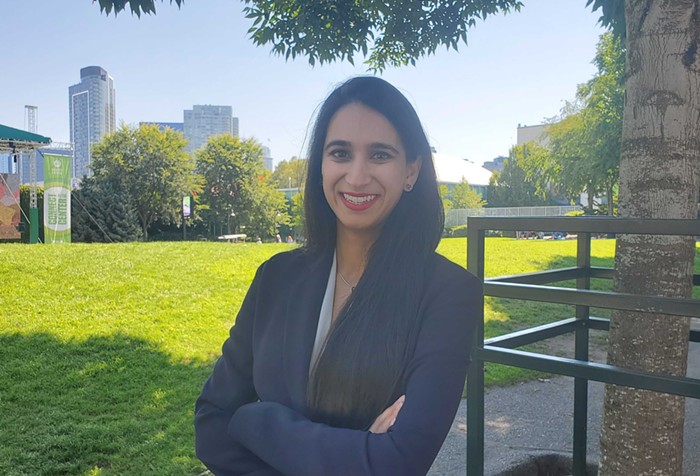For Pooja Vaddadi, challenging the presiding judge of the Seattle Municipal Court is as much about pushing back against the surging popularity of lock-‘em-up rhetoric as it is about replacing a judge she views as the “most prosecutor-friendly” jurist on the bench.
A first-generation Indian-American, Vaddadi has spent her career practicing in Pierce, Snohomish, and King County courts as a private and public defense attorney, with a brief break from criminal work during the pandemic to earn her Masters in Law from the University of California - Berkeley. She says her experience working with people accused of misdemeanor crimes convinced her of the need to adopt restorative justice approaches to public safety rather than upholding the system’s current focus on punishment and jail.
The Competition
Taking on presiding Judge Adam Eisenberg won’t be easy, however. Her opponent touts a laundry list of endorsements from sitting and retired judges, and he is apparently popular enough with his colleagues to get elected as presiding judge in the midst of his reelection campaign.
But Eisenberg also has his fair share of critics in the legal community, earning the lowest rating of all Seattle Municipal Court judges for impartiality and professionalism in a recent survey of King County Bar Association lawyers. Some of that discontent appears to have motivated support for Vaddadi’s campaign, which boasts twice the campaign donations of any other judicial candidate. In a race that will likely earn little media coverage, she’ll need every dollar she can get to out-communicate an established incumbent.
The Power of One Voice

Vaddadi told me in an interview that she made her decision to run this year after witnessing one judge in Seattle Municipal Court keep a colleague’s client in jail even though the prosecutor hadn’t asked for continued detention. Even worse, Vaddadi says the judge made that call despite knowing that it would likely cost the transient man his newly secured temporary housing. For her, that decision signified the overly punitive approach judges in the City’s misdemeanor court have embraced since City Attorney Ann Davison took office in January.
Davison’s administration has focused on increasing mainstream prosecutions for minor crimes like shoplifting and trespass instead of using restorative justice programs like Community Court to address the root causes of criminal behavior. In Vaddadi’s opinion, the judges at Seattle Municipal Court have a responsibility to push back on punitive policies that research shows do little to reduce crime. But the judges didn’t do that when they overruled the judge overseeing Community Court and allowed Davison to categorically bar so-called “high utilizers” of the criminal legal system from the diversion program.
Vaddadi acknowledges that even if she were to win her race, she’d only be a second voice in a vocal minority opposing what she views as a backslide toward failed punitive policies. But she believes that the simple act of running a viable campaign against an established incumbent can help change that dynamic over time by creating a blueprint for other younger, progressive attorneys to follow.
Pursuing Public Safety Strategies Supported by Research
If she does prevail in November, Vaddadi says she wants to use the relationships she’s built with elected officials on the campaign trail to advocate for more funding for diversion programs so that more low-income people can access them. She also plans to push for expanding diversion programs that prove successful at the King County Superior Court level so that people in Seattle Municipal Court can benefit from them as well.
For Vaddadi, her focus on diversion programs stems from her belief that no one is beyond help, and from a recognition that the criminal legal system creates much of the harm its proponents say they want it to prevent.
Vaddadi’s experience as a public defender showed her that people rarely commit serious crimes as their first criminal offense, and that focusing on proven methods to intervene in peoples’ lives before they progress to that level of violence is the best way to improve public safety. By advocating for more treatment options for people in mental health court and dedicated supportive housing for people whose repeated criminal behavior stems from housing insecurity, Vaddadi hopes to minimize the additional trauma the system inflicts on the people in her court while simultaneously reducing crime.
Pushing for the funding those additional services would require will be a challenge, and Vaddadi admitted that she’ll be confined by the limits of the Court’s existing programs in her day-to-day administration of her court. But with local elected officials organizing around what they call a crisis in our region’s behavioral and mental health care system, Vaddadi may find more support in that advocacy than previous reformers interested in a public health approach to reducing crime.
Vaddadi also sees an opportunity to reduce the trauma the criminal legal system inflicts on people by administering her court with more independence from city prosecutors than she’s seen her opponent demonstrate. She called out her reluctance to default to granting prosecutors’ request for bail as a change she’d make as a judge, saying that imposing even minimal amounts of bail on people who “don’t have five cents to their name” isn’t an effective deterrent to keep those people from committing additional crimes of survival.
Instead, she says this kind of pre-trial detention only contributes to the “pattern of abuse” she’s seen play out in Seattle Municipal Court on a daily basis. To Vaddadi, focusing on keeping people locked up reveals too narrow of an understanding of what public safety really means.
“Public safety isn’t just about keeping people off the streets, public safety is about safeguarding everyone’s constitutional rights. It’s about making sure the police actually do their job, making sure prosecutors actually use their discretion, and making sure defense attorneys aren’t doing any sort of shady business.”
If she wins in November, Vaddadi hopes to do her part from the bench to achieve that holistic vision of public safety for everyone in Seattle.
To read our profile of Vaddadi's opponent, Adam Eisenberg, click here.














